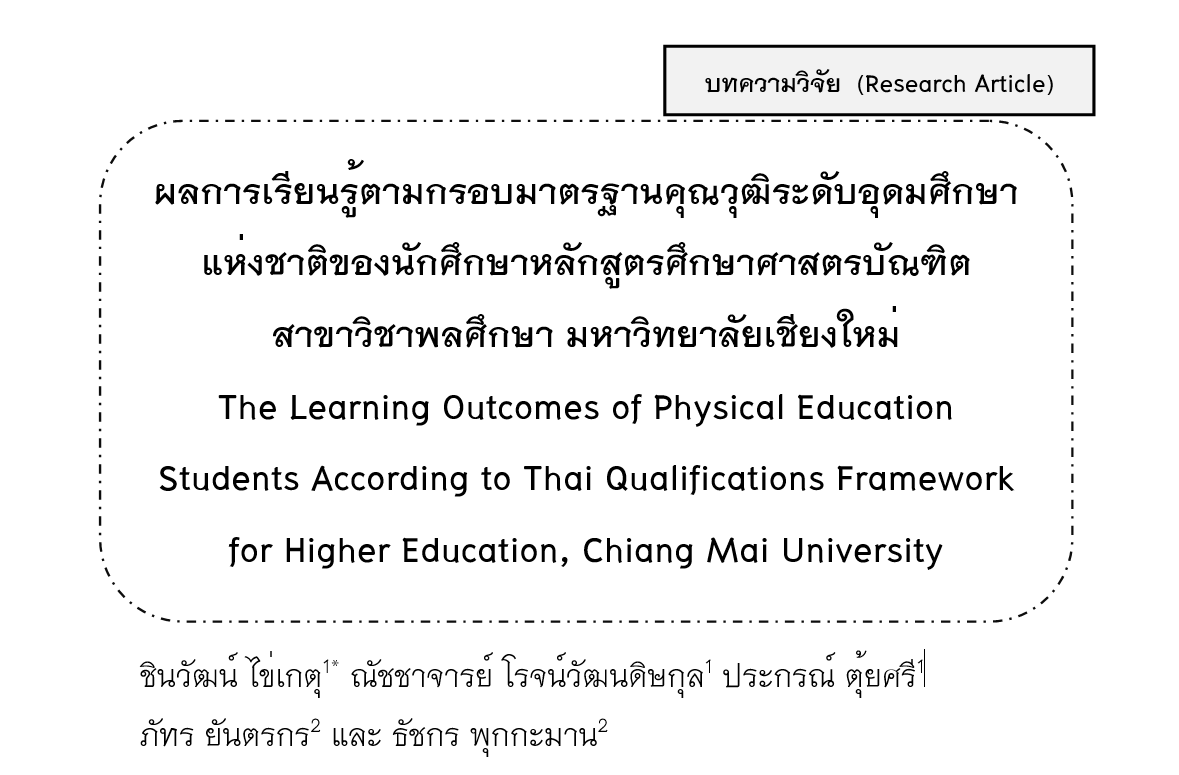The Learning Outcomes of Physical Education Students According to Thai Qualifications Framework for Higher Education, Chiang Mai University
Keywords:
Learning Outcome, Thai Qualifications Framework, Physical EducationAbstract
This research aimed to investigate and compare the opinion toward the learning outcomes according to the National Qualifications Framework for Higher Education. The sample consisted of 106 preservice teachers with the major of physical education in the Faculty of Education, Chiang Mai University in 2019. They were at different years of the program. The data was collected by using a self-reporting from the five-scale questionnaire with six aspects totaling accounted for 141 questions. Which was verified for content validity from each IOC by three experts, ranging from 0.67 to 1.00 and also calculated confidentially by using Cronbach's alpha coefficient (a) that equal to 0.993. The data were analyzed to calculate frequency, percentage, mean, standard deviation and one-way analysis of variance, as well as Scheffé method. The results indicate that:
- The opinion toward the learning outcomes according to the National Qualifications Framework for Higher Education and individually regarding each aspect are collectively high. The highest mean is the moral and ethical aspect, following by the aspects of knowledge, the cognitive skills, interpersonal skills and responsibility, computational, communication and ICT skills, and learning skills.
- The opinion from the preservice teachers with different years were significantly different according to learners toward the National Qualifications Framework for Higher Education in the aspects of interpersonal skills and responsibility has a different in learning skills at the level of .05. However, Scheffé test indicated that there were no significant differences between each pair of the preservice teachers toward the different years.
References
กระทรวงศึกษาธิการ. (2562). ประกาศกระทรวงศึกษาธิการ เรื่อง มาตรฐานคุณวุฒิระดับปริญญาตรี สาขาครุศาสตร์และสาขาศึกษาศาสตร์ (หลักสูตรสี่ปี) พ.ศ. 2562. สืบค้น 6 กุมภาพันธ์ 2563. จาก http://www.mua.go.th/users/tqf-hed/news/data6/Bachelor%20of%20Education-4Y-2562_r.pdf.
คณะกรรมการอุดมศึกษา. (2552). ประกาศคณะกรรมการอุดมศึกษา เรื่อง แนวทางการปฏิบัติตามกรอบมาตรฐานคุณวุฒิระดับอุดมศึกษาแห่งชาติ พ.ศ. 2552. สืบค้น 6 กุมภาพันธ์ 2563. จาก http://www.mua.go.th/users/tqf-hed/.
คณะศึกษาศาสตร์. (2558). หลักสูตรศึกษาศาสตรบัณฑิต สาขาวิชาพลศึกษา (5 ปี). หลักสูตรปรับปรุง พ.ศ. 2558. เชียงใหม่: มหาวิทยาลัยเชียงใหม่.
คณะศึกษาศาสตร์. (2561). หลักสูตรศึกษาศาสตรบัณฑิต สาขาวิชาพลศึกษา (5 ปี).หลักสูตรปรับปรุง พ.ศ. 2561. เชียงใหม่: มหาวิทยาลัยเชียงใหม่.
คณะศึกษาศาสตร์. (2562). หลักสูตรศึกษาศาสตรบัณฑิต สาขาวิชาพลศึกษา (4 ปี) หลักสูตรปรับปรุง พ.ศ. 2562. เชียงใหม่: มหาวิทยาลัยเชียงใหม่.
เจริญ ภูวิจิตร. (2560). การพัฒนาครูเพื่อผลการเรียนรู้ในศตวรรษที่ 21. สืบค้น 22 มีนาคม 2563. จากhttp://www.nidtep.go.th/webnidtep2015/files/170560_Teachers%20Development21.pdf.
บุญชม ศรีสะอาด. (2553). การวิจัยเบื้องต้น (พิมพ์ครั้งที่ 8). กรุงเทพฯ: สุวีริยาสาส์น.
ภาพพิมพ์ พรหมวงศ์. (2561). คุณลักษณะอันพึงประสงค์ของบัณฑิตหลักสูตรครุศาสตรบัณฑิต สาขาวิชาพลศึกษา คณะครุศาสตร์ มหาวิทยาลัยนครพนม. วารสารมหาวิทยาลัยนครพนม. ฉบับการประชุมวิชาการครบรอบ 25 ปี วิทยาลัยพยาบาลบรมราชชนนีนครพนม มหาวิทยาลัยนครพนม, 111 – 119. สืบค้น 31 เมษายน 2563. จาก https://so03.tci-thaijo.org/index.php/npuj/article/view/94082/87957.
สมเกียรติ อินทสิงห์ สุนีย์ เงินยวง และน้ำผึ้ง อินทะเนตร. (2562). การทวนสอบผลสัมฤทธิ์ของนักศึกษาตามมาตรฐานผลการเรียนรู้. ฝ่ายส่งเสริมการจัดการเรียนการสอน สำนักพัฒนาคุณภาพการศึกษา. เชียงใหม่: มหาวิทยาลัยเชียงใหม่. สืบค้น 31 เมษายน 2563. จาก http://eqd2019.eqd.cmu.ac.th/Innovation/em/data/handbook/VerificationPocketBook.pdf.
สุวิมล ติรกานันท์. (2546). การใช้สถิติในงานวิจัยทางสังคมศาสตร์:แนวทางสู่การปฏิบัติ. กรุงเทพฯ: โรงพิมพ์แห่งจุฬาลงกรณ์มหาวิทยาลัย.
สำนักพัฒนาคุณภาพการศึกษา มหาวิทยาลัยเชียงใหม่. (2559). รายงานผลการวิจัยเรื่องความพึงพอใจของนายจ้างผู้ประกอบการ ผู้บังคับบัญชาบัณฑิต มหาวิทยาลัยเชียงใหม่ ประจำปีการศึกษา 2559. ฝ่ายส่งเสริมมาตรฐานและประกันคุณภาพการศึกษา. เชียงใหม่: มหาวิทยาลัยเชียงใหม่.
สำนักพัฒนาคุณภาพการศึกษา มหาวิทยาลัยเชียงใหม่. (2560). รายงานผลการวิจัยเรื่องความพึงพอใจของนายจ้างผู้ประกอบการ ผู้บังคับบัญชาบัณฑิต มหาวิทยาลัยเชียงใหม่ ประจำปีการศึกษา 2560. ฝ่ายส่งเสริมมาตรฐานและประกันคุณภาพการศึกษา. เชียงใหม่: มหาวิทยาลัยเชียงใหม่.
สำนักพัฒนาคุณภาพการศึกษา มหาวิทยาลัยเชียงใหม่. (2561). รายงานผลการวิจัยเรื่องความพึงพอใจของนายจ้างผู้ประกอบการ ผู้บังคับบัญชาบัณฑิต มหาวิทยาลัยเชียงใหม่ ประจำปีการศึกษา 2561. ฝ่ายส่งเสริมมาตรฐานและประกันคุณภาพการศึกษา. เชียงใหม่: มหาวิทยาลัยเชียงใหม่.
อเนชา เพียรทองและ ดารณี สําราญผล. (2557). คุณลักษณะที่เป็นจริงตามกรอบมาตรฐานคุณวุฒิระดับอุดมศึกษาแห่งชาติในรายวิชาดาบสากลของนักศึกษาสถาบันการพลศึกษาวิทยาเขตชลบุรี. วารสารสังคมศาสตร์, 3(2), 30 -35.
Oliva, P. F., & Gordon II, W. R. (2013). Developing the Curriculum (8th ed.). Singapore: Pearson Education South Asia Pte Ltd.
Ornstein, A. C., & Hunkins, F. P. (2018). Curriculum Foundations, Principles and Issues (7th ed.). New Jersey: Englewood Cliffs.

Downloads
Published
How to Cite
Issue
Section
License
Copyright (c) 2021 Phayao University

This work is licensed under a Creative Commons Attribution-NonCommercial-NoDerivatives 4.0 International License.
ผู้นิพนธ์ต้องรับผิดชอบข้อความในบทนิพนธ์ของตน มหาวิทยาลัยพะเยาไม่จำเป็นต้องเห็นด้วยกับบทความที่ตีพิมพ์เสมอไป ผู้สนใจสามารถคัดลอก และนำไปใช้ได้ แต่จะต้องขออนุมัติเจ้าของ และได้รับการอนุมัติเป็นลายลักษณ์อักษรก่อน พร้อมกับมีการอ้างอิงและกล่าวคำขอบคุณให้ถูกต้องด้วย
The authors are themselves responsible for their contents. Signed articles may not always reflect the opinion of University of Phayao. The articles can be reproduced and reprinted, provided that permission is given by the authors and acknowledgement must be given.







